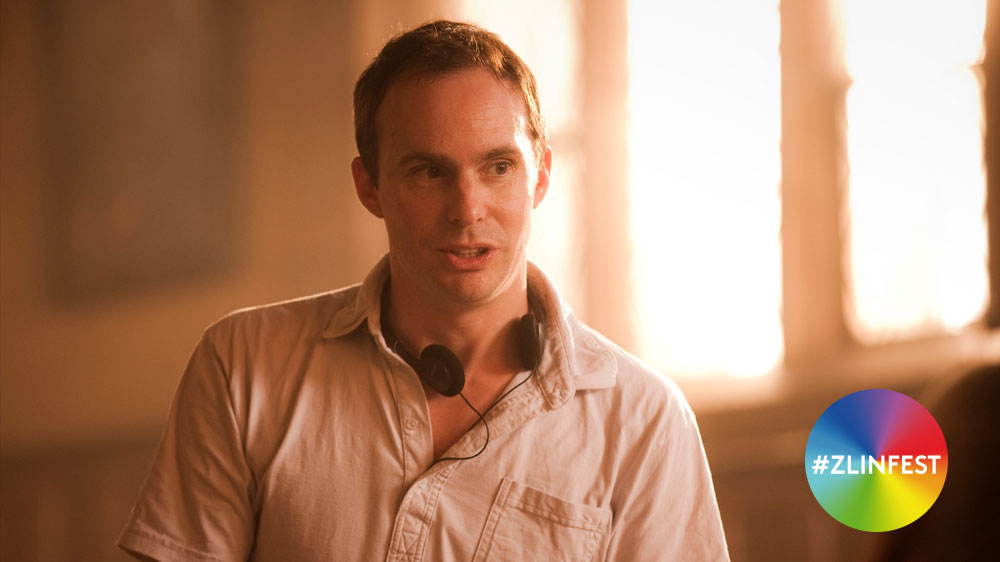Jim Loach about MEASURE OF A MAN
“We had to drag ourselves out of bed very early to catch the light”
Bobby (Blake Cooper), an under-confident, overweight 14-year-old city boy spends a summer by the lake, where a local gang of youngsters finds an easy victim for their bullying in him. In such desperate situations, what help is there to expect from parents or friends? None. Not until Bobby meets Mr. Kahn (Donald Sutherland), a Wall Street veteran and surrogate fatherly presence who mentors the boy through difficult times. The warm sunlight, dimmed by the trees around the lake can be misleading … the idyllic atmosphere contrasts brutally with commonplace small town cruelty.

You can see this film
SATURDAY | 25.05 | 17:00 | GOLDEN APPLE CINEMA 6
MONDAY | 27.05 | 17:20 | GOLDEN APPLE CINEMA 2
The title refers to a beautiful quote in the film. Where does that one come from?
Jim Loach: David Scearce wrote the script, and this was his idea. We talked about that phrase, because it’s quite a well-known one, and it has been used by different people in different contexts from time to time. We actually toyed with other titles for the film, but always came back to MEASURE OF A MAN, because it seemed to go to the heart of the story we wanted to tell.
The sunlight adds a particular tone to the film, that makes the summer season almost physically tangible.
Loach: We wanted to evoke the idea of summer in a very atmospheric way, almost like fragments of a memory. We used a lot of very low light straight into the camera, flares and strong back light. When we shot the film, it was actually quite rainy most of the time, so we had to drag ourselves out of bed very early to catch the light!
This year we have a lot of films in the competition about ‘outsiders’, those who are a bit different. Is that a director’s choice or a necessity?
Loach: I’m drawn to stories of outsiders. I mean, I guess we all are in a way? I think we can all relate to that feeling of seeming to be on the outside, looking in through a window at a party to which we aren’t invited. I think especially as a teenager you want to fit in, and that’s what Bobby wants.
With such a harsh subject, how did you measure the degree of bullying so that it is still bearable to watch?
Loach: My approach is just to be as truthful as you can - truthful to those characters, in that situation, in the context of that story. We just thought: what is the worst thing that those bullies can do to Bobby? Stripping him and leaving him naked and humiliated would be something he would never forget and find very hard to forgive.
I was also intrigued by the viewpoint of Michelle, Bobby’s sister, stuck between shame and empathy.
Loach: She is at a crossroads too. She is at an age where she is just discovering herself as an adult, exploring her sexuality. She is vulnerable too because she is still so young. I think she cares deeply about her younger brother, but she has just got her own thing going on.
For grown-ups, who are inevitably outsiders in such situations, it is difficult to lend a helping hand or to measure the situation correctly. While for parents it is so painful to see their child suffering.
Loach: It is difficult, isn’t it? I mean, maybe there is just some stuff you have to find out for yourself, as you grow up. It is tempting to try and interfere and make things okay, but it doesn’t always work. Certainly Bobby has to figure out what he needs to do on his own. But he isn’t totally alone - Dr Kahn has a profound effect on him that maybe he wouldn’t even recognise until much later in life.
How did you record this memorably funny scene with the resurrection of a bird?
Loach: We had to source a recently deceased bird. We treated it very respectfully, honestly. We had about three or four live ones that matched on the day we shot the scene. The rest is a trick of the staging and editing.
Another remarkable scene was Bobby, imitating the cool dance moves he sees on TV – which is funny and tragic at the same time. How was the atmosphere on set when recording that scène?
Loach: It was a scene we talked about quite a bit, but we weren’t really sure what to do. Then one day, Blake Cooper came in with a video he’d recorded on his phone of him doing a dance in his hotel room. I laughed so much, it was so funny and sweet and endearing and truthful. Then when we shot the scene, it was actually a lot of fun. I was talking to Blake throughout - you know, telling him what to do, where to go and things like that. But what made the scene work was that Blake committed to it. Emotionally and physically, he was prepared to take a risk and expose himself in that way. That’s why people respond to that scene so much I think.
Donald Sutherland was more or less born for this role. Did he realize that himself or did you have a hard time convincing him?
Loach: We sent him the script, because we always knew we wanted him. And he called me while I was on holiday in France, on the beach. He just had a very strong, immediate connection with the character. He was just like “count me in”. It was a good day in the life of this movie. (GH)